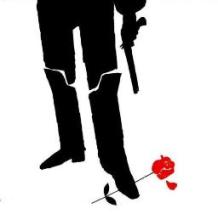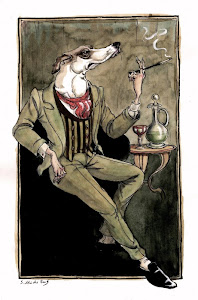 The White Russian general and pan-monarchist Baron Roman von Ungern-Sternberg (1885-1921), decorated veteran of the Russo-Japanese War and World War I. Descended from a Baltic German clan of knights and privateers, von Ungern-Sternberg fought with Semyonov's forces in the Russian Civil War. He led his Asian Cavalry Division into Mongolia where he drove out the Chinese republican forces and restored the Bogd Khan. His dream was to restore the Qing Dynasty and Romanov Dynasty to force an Asiatic Imperial alliance that would destroy Bolshevism and restore the traditional reverence for monarchy and religion. The XIII Dalai Lama declared him to be a Mahakala incarnation; the Bogd declared him a co-reincarnation of his own predecessor. Mongolians referred to him as the "God of War". He was the last Czarist Russian general to be captured and executed.
The White Russian general and pan-monarchist Baron Roman von Ungern-Sternberg (1885-1921), decorated veteran of the Russo-Japanese War and World War I. Descended from a Baltic German clan of knights and privateers, von Ungern-Sternberg fought with Semyonov's forces in the Russian Civil War. He led his Asian Cavalry Division into Mongolia where he drove out the Chinese republican forces and restored the Bogd Khan. His dream was to restore the Qing Dynasty and Romanov Dynasty to force an Asiatic Imperial alliance that would destroy Bolshevism and restore the traditional reverence for monarchy and religion. The XIII Dalai Lama declared him to be a Mahakala incarnation; the Bogd declared him a co-reincarnation of his own predecessor. Mongolians referred to him as the "God of War". He was the last Czarist Russian general to be captured and executed.
05 March 2011
God of War: Baron von Ungern-Sternberg
 The White Russian general and pan-monarchist Baron Roman von Ungern-Sternberg (1885-1921), decorated veteran of the Russo-Japanese War and World War I. Descended from a Baltic German clan of knights and privateers, von Ungern-Sternberg fought with Semyonov's forces in the Russian Civil War. He led his Asian Cavalry Division into Mongolia where he drove out the Chinese republican forces and restored the Bogd Khan. His dream was to restore the Qing Dynasty and Romanov Dynasty to force an Asiatic Imperial alliance that would destroy Bolshevism and restore the traditional reverence for monarchy and religion. The XIII Dalai Lama declared him to be a Mahakala incarnation; the Bogd declared him a co-reincarnation of his own predecessor. Mongolians referred to him as the "God of War". He was the last Czarist Russian general to be captured and executed.
The White Russian general and pan-monarchist Baron Roman von Ungern-Sternberg (1885-1921), decorated veteran of the Russo-Japanese War and World War I. Descended from a Baltic German clan of knights and privateers, von Ungern-Sternberg fought with Semyonov's forces in the Russian Civil War. He led his Asian Cavalry Division into Mongolia where he drove out the Chinese republican forces and restored the Bogd Khan. His dream was to restore the Qing Dynasty and Romanov Dynasty to force an Asiatic Imperial alliance that would destroy Bolshevism and restore the traditional reverence for monarchy and religion. The XIII Dalai Lama declared him to be a Mahakala incarnation; the Bogd declared him a co-reincarnation of his own predecessor. Mongolians referred to him as the "God of War". He was the last Czarist Russian general to be captured and executed.
Subscribe to:
Post Comments (Atom)





















8 comments:
Clearly his is a fascinating story. Any Biography of him floating around?
Thanks...
Of interest?
"Chapayev and Void", known in the US as "Buddha's Little Finger" and in the UK as "Clay Machine Gun", is a novel by Victor Pelevin--Baron von Ungern-Sternberg is a character in in it, depicted as the sovereign of esoteric spiritual "Inner Mongolia".
Beasts, Men and Gods, by Ferdinand Ossendowski (1922)
Baron Ungern von Sternberg – der letzte Kriegsgott (2007)
The History of Baron Ungern: An Experience of Reconstruction, by Sergei Kuzmin (2011)
Corto Maltese in Siberia, by Hugo Pratt (1974)
The Baron can also be found in Hugo Pratt's Corto Maltese stories.
One critic has said of the Baron: "...he has become a twisted sort of icon of pan-monarchist right-wing sentiment."
Of course, if someone called me a twisted right-wing pan-monarchist I'd say Thank You.
Sorry, missed the last Anonymous comment. Beat me to the Corto punch.
Check You Tube for a couple of films about him. He was quite a character. I first encountered him in Corto Maltese.
For the french readers:
"Ungern le baron fou" Jean Mabire (1973),
and a second edition:
"Ungern, le Dieu de la guerre", Jean Mabire (1987).
Ossendowski's book is wonderfull, reminds me of the movie "Derzu Uzala" (Akira Kurosawa).
Post a Comment